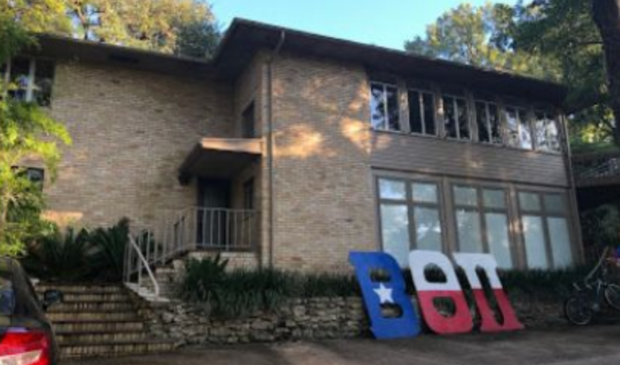Board of Adjustment searches for the line between ‘fraternizing’ and ‘frat’
Wednesday, April 10, 2019 by
Jessi Devenyns After purchasing former Texas Governor Ann Richards’ home on 2311 Shoal Creek Boulevard in 2017, the Texas Beta Students Aid Fund, which is the nonprofit arm of the Beta Theta Pi fraternity, retained single-family zoning on the property. Yet neighbors reported that there was an unusually high level of activity occurring in the house – even for a Texas football season.
“Clearly they’re purchasing that house for the fraternity’s purposes,” attorney Bobby Levinski told board members at the April 8 meeting of the Board of Adjustment. He argued that since their use of the home was above that of an average single-family home, the single-family designation was inappropriate.
City staff had originally determined to leave the zoning unchanged based on conversations with the then-new property owners. At the time, Planning and Zoning Director Jerry Rusthoven said that the property met single-family zoning: It did not have over six unrelated individuals living there, which would designate group residential zoning, and it did not meet the requirements for a club/lodge conditional use designation, which requires “the use of a site for provision of meeting, recreational, or social facilities by a private or nonprofit association, primarily for use by members and guests,” since there is an individual living on-site. Nor did the property qualify for the civic use designation of the club/lodge use, as the person living on-site was not paid by the fraternity for maintenance of the property.
After the owner of the property requested postponement at the April 8 meeting, board members overrode the request to hear the case.
Upon opening the case, testimony revealed that the four study halls and weekly chapter meeting that fraternity board member Gregg Young alleged were held on the property were actually more akin to a typical frat party than a gathering for edification. Levinski showed photos as evidence of parties in conjunction with other university Greek houses as well as Facebook event pages advertising the events.
Although attorney Matt Maupin, who spoke on behalf of the Texas Beta Students Aid Fund, explained that the photos in evidence did not depict their chapter members, Levinski noted, “I was very careful to make sure that they were the events being held in the house.”
The house is listed on Facebook, its own website and Google as a fraternity. On the actual structure there are large Greek letters publicizing its membership with Greek organizations.
When asked why it was opposed to changing its zoning designation when it advertised itself as a fraternity, Maupin told the Austin Monitor that they had no comment on the matter but that they didn’t feel they required any additional permitting to engage in their current functions.
Neighbors from as far as three and a half blocks away came to testify in front of the board that the noise from weeknight activities kept them awake long past an appropriate hour.
“They do drink and they do make noise,” said neighbor Olivia Ruiz.
Earlier testimony from Young said that there was a zero-tolerance policy for alcohol on-site. “One strike and you’re out,” he said.
Half a dozen neighbors attested that they had called in code complaints on the property over the last year. Both Maupin and Young said that there had never been one violation on their part.
“Lack of citations does not necessarily mean lack of violation,” said Board Member Don Leighton-Burwell. “I can see in one of the pictures a code violation even if they weren’t cited for that.”
Beyond code issues, Levinski pointed out that there was one resident in the building who was paid for lawn services on the property. When board members tried to ascertain if there were more individuals living in the house, Young said, “I’ve not seen more than two member names (on mail).” However, he did not appear to keep a sharp eye on residents and their compliance with any sort of monthly payment. “There is a bill accrued. And I will say they are supposed to pay. I do not know whether they pay or not,” he said.
“I actually think it is Greek residential, and I don’t think it is permitted in the residential district,” said Board Member Melissa Hawthorne, who suggested postponement in order to allow the board time to determine the ramifications either of permitting or denying the use of single-family homes for Greek life.
As that determination would be non-site-specific, Rusthoven informed the board that there could be far-reaching consequences. According to him, there are plenty of single-family homes that are under the care of Greek organizations at higher education campuses in town. “We may have a noncompliance issue,” he said.
While the board weighs how to proceed next month, it unanimously postponed the case and encouraged the neighborhood to work with the fraternity to find an interim solution. Board members Rahm McDaniel and Kelly Bloom were absent.
Photo courtesy of the city of Austin.
The Austin Monitor’s work is made possible by donations from the community. Though our reporting covers donors from time to time, we are careful to keep business and editorial efforts separate while maintaining transparency. A complete list of donors is available here, and our code of ethics is explained here.
You're a community leader
And we’re honored you look to us for serious, in-depth news. You know a strong community needs local and dedicated watchdog reporting. We’re here for you and that won’t change. Now will you take the powerful next step and support our nonprofit news organization?








